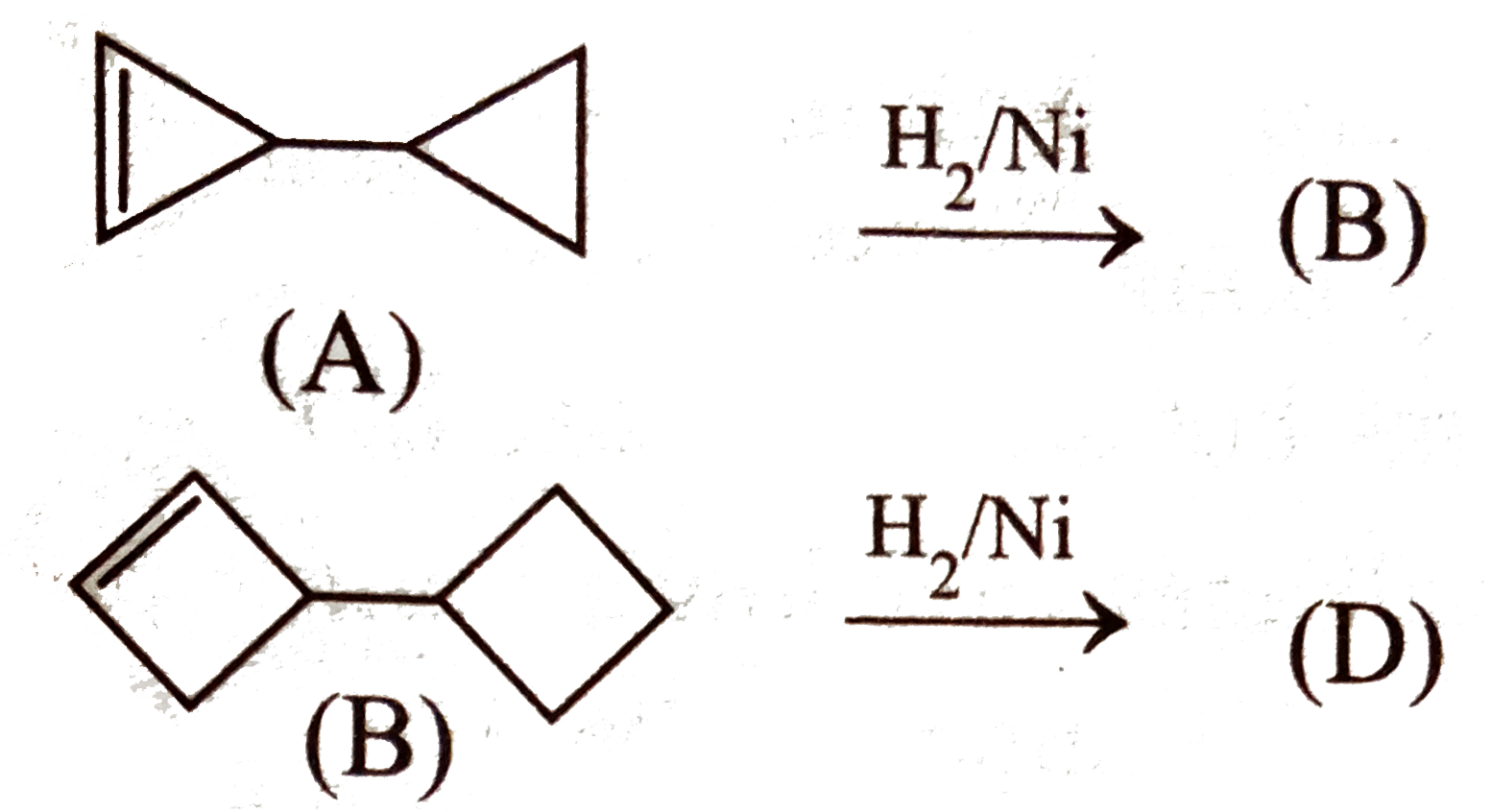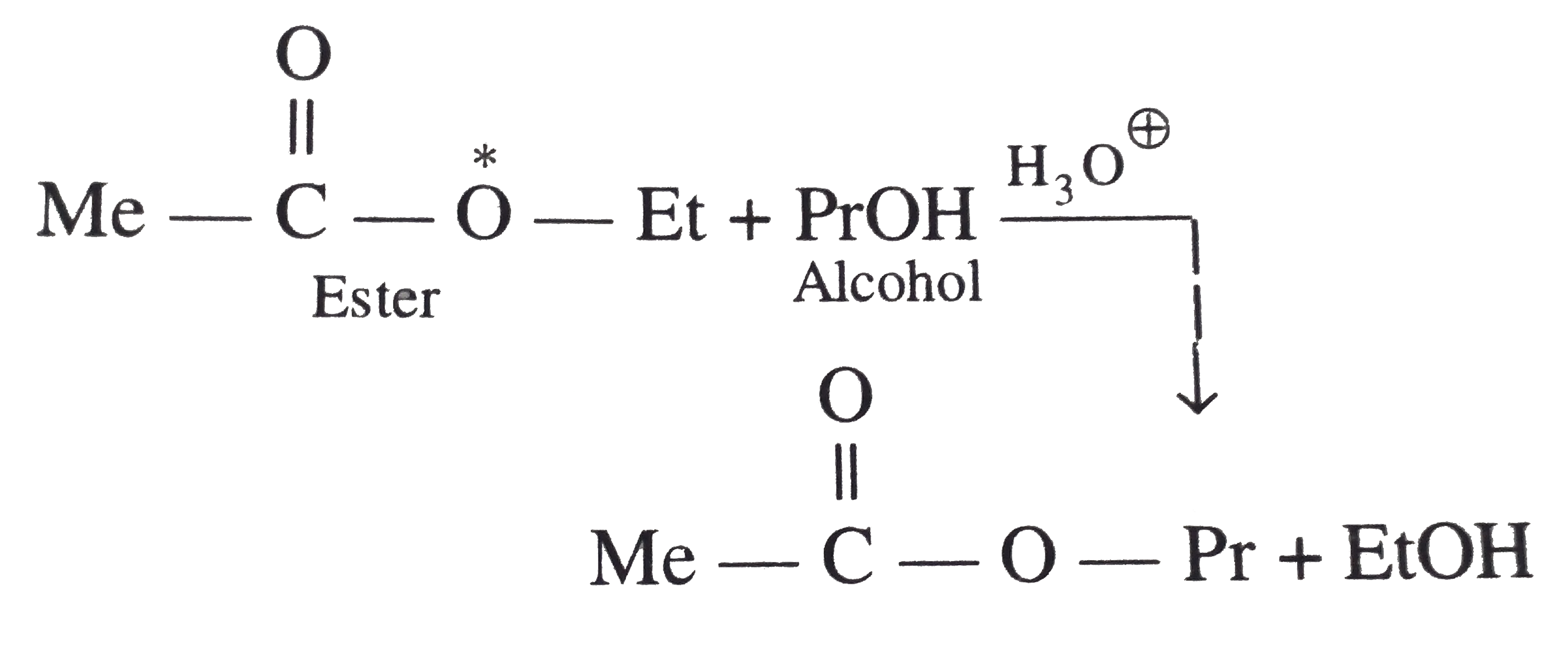Carboxylic acid, although unreactive to alcohols, reacts in the presence of small amount of conc.H2SO4 or with 2−3% of HCl ?
RCOOH+R'OHH⊕⇐⇒RCOOR'+H2O
Which of the following statements is//are correct about the above reaction ?
(I) This reaction is called Fischer esterification reaction.
(II) The equilibrium is shifted to R.H.S if H2O is removed by azeotropic distillation with benzene.
(III) The reaction of RCOCl and R'OH to give ester (RCOOR') is irreversible and more feasible than esterification of RCOOH.
(IV) If the above esterification of RCOOH is carried out in excess of R'OH, the equilibrium is shifted to R.H.S.
(I),(II)
(I),(II),(III)
(I),(II),(IV)
All
The correct Answer is:D
To analyze the question regarding the reaction of carboxylic acids with alcohols in the presence of concentrated sulfuric acid or hydrochloric acid, we will evaluate each statement one by one.
1. Understanding the Reaction:
The reaction between a carboxylic acid (RCOOH) and an alcohol (R'OH) in the presence of an acid catalyst (like concentrated H2SO4 or HCl) leads to the formation of an ester (RCOOR') and water (H2O). This process is known as Fischer esterification.
Hint: Remember that Fischer esterification is a key reaction in organic chemistry for forming esters from carboxylic acids and alcohols.
2. Evaluating Statement I:
The first statement claims that this reaction is called Fischer esterification. This is true, as the reaction indeed falls under this category.
Hint: Fischer esterification is characterized by the formation of an ester and water from a carboxylic acid and an alcohol.
3. Evaluating Statement II:
The second statement mentions that the equilibrium is shifted to the right (towards the formation of products) if water is removed by azeotropic distillation with benzene. This is also correct, as removing a product (water) from the equilibrium will shift the reaction towards the product side according to Le Chatelier's principle.
Hint: Le Chatelier's principle states that if a system at equilibrium is disturbed, it will shift in a direction that counteracts the disturbance.
4. Evaluating Statement III:
The third statement discusses the reaction of acyl chlorides (RCOCl) with alcohols to form esters. This reaction is indeed irreversible and more feasible than the esterification of carboxylic acids because acyl chlorides are more reactive due to the better leaving group (Cl-). Therefore, this statement is correct.
Hint: Acyl chlorides are more reactive than carboxylic acids due to the presence of a better leaving group, making the reaction proceed to completion.
5. Evaluating Statement IV:
The fourth statement states that if the esterification of RCOOH is carried out in excess R'OH, the equilibrium is shifted to the right. This is true as increasing the concentration of one reactant (R'OH) will shift the equilibrium towards the product side.
Hint: Increasing the concentration of reactants in an equilibrium reaction favors the formation of products.
Conclusion:
All four statements (I, II, III, and IV) are correct regarding the Fischer esterification reaction and the conditions affecting its equilibrium.
Final Answer: All statements are correct.
The reaction between a carboxylic acid (RCOOH) and an alcohol (R'OH) in the presence of an acid catalyst (like concentrated H2SO4 or HCl) leads to the formation of an ester (RCOOR') and water (H2O). This process is known as Fischer esterification.
The first statement claims that this reaction is called Fischer esterification. This is true, as the reaction indeed falls under this category.
The second statement mentions that the equilibrium is shifted to the right (towards the formation of products) if water is removed by azeotropic distillation with benzene. This is also correct, as removing a product (water) from the equilibrium will shift the reaction towards the product side according to Le Chatelier's principle.
The third statement discusses the reaction of acyl chlorides (RCOCl) with alcohols to form esters. This reaction is indeed irreversible and more feasible than the esterification of carboxylic acids because acyl chlorides are more reactive due to the better leaving group (Cl-). Therefore, this statement is correct.
The fourth statement states that if the esterification of RCOOH is carried out in excess R'OH, the equilibrium is shifted to the right. This is true as increasing the concentration of one reactant (R'OH) will shift the equilibrium towards the product side.
All four statements (I, II, III, and IV) are correct regarding the Fischer esterification reaction and the conditions affecting its equilibrium.
Topper's Solved these Questions
- CARBOXYLIC ACIDS AND THEIR DERIVATIVESBOOK - CENGAGE CHEMISTRY ENGLISHCHAPTER - CARBOXYLIC ACIDS AND THEIR DERIVATIVESEXERCISE - Exercises (Assertion-Reasoning)
10 Videos
- CARBOXYLIC ACIDS AND THEIR DERIVATIVESBOOK - CENGAGE CHEMISTRY ENGLISHCHAPTER - CARBOXYLIC ACIDS AND THEIR DERIVATIVESEXERCISE - Exercises Archives (Single Correct)
10 Videos
- CARBOXYLIC ACIDS AND THEIR DERIVATIVESBOOK - CENGAGE CHEMISTRY ENGLISHCHAPTER - CARBOXYLIC ACIDS AND THEIR DERIVATIVESEXERCISE - Exercises (Multiple Correct)
34 Videos
- BIOMOLECULESBOOK - CENGAGE CHEMISTRY ENGLISHCHAPTER - BIOMOLECULESEXERCISE - Exercises Archives (Analytical And Descriptive)
8 Videos
- CHEMICAL KINETICSBOOK - CENGAGE CHEMISTRY ENGLISHCHAPTER - CHEMICAL KINETICSEXERCISE - Archives Subjective
23 Videos
Similar Questions
Which of the statements is/are correct about the following reactions ?
 H2/Ni−−−→ H2/Ni−−−→
H2/Ni−−−→ H2/Ni−−−→
View SolutionIn the reaction
I2+C2H5OH+өOH→CHI3+HCOOө+H2O+Iө
Which of the following statements is/are correct?
View SolutionEtCOCl(A)(i)H2N.OH−−−−−−−→(ii)ӨOH(B)EtOH−−−→(C)
Which of the following statements are correct about the given reaction ?
View SolutionWhich of the following statements is/are correct about the reaction.
4CrO5+6H2SO4→2Cr2(SO4)3+6H2O+7O2
View SolutionPhCOOH(A)(i)N2H,H⊕−−−−−−−−→(ii)Δ(B)H2O/ӨOH−−−−−→(C)
Which of the following statement is /are correct about the reaction ?
View SolutionWhich of the following statements is wrong about the transesterification reaction, catalysed by H3O⊕(H2SO4ordryHCl) or ROӨ(EtONa) ?
 .
.
View SolutionIn esterification reaction, the role of conc. H2SO4 is
View SolutionWhich of the following statements about the reaction is/are correct?
HgS+HCl+HNO3→H2HgCl4+NO+S+H2O
View SolutionWhich of the following statements is/are correct about the reaction.
H2SO4+Cu3P+Cr2O2−7→CuSO4+H3PO4+2Cr3+
View SolutionWhich of the following is not correct for given reaction :-
XeF6+H2O−−−→B+H2O−−−→C
View Solution
